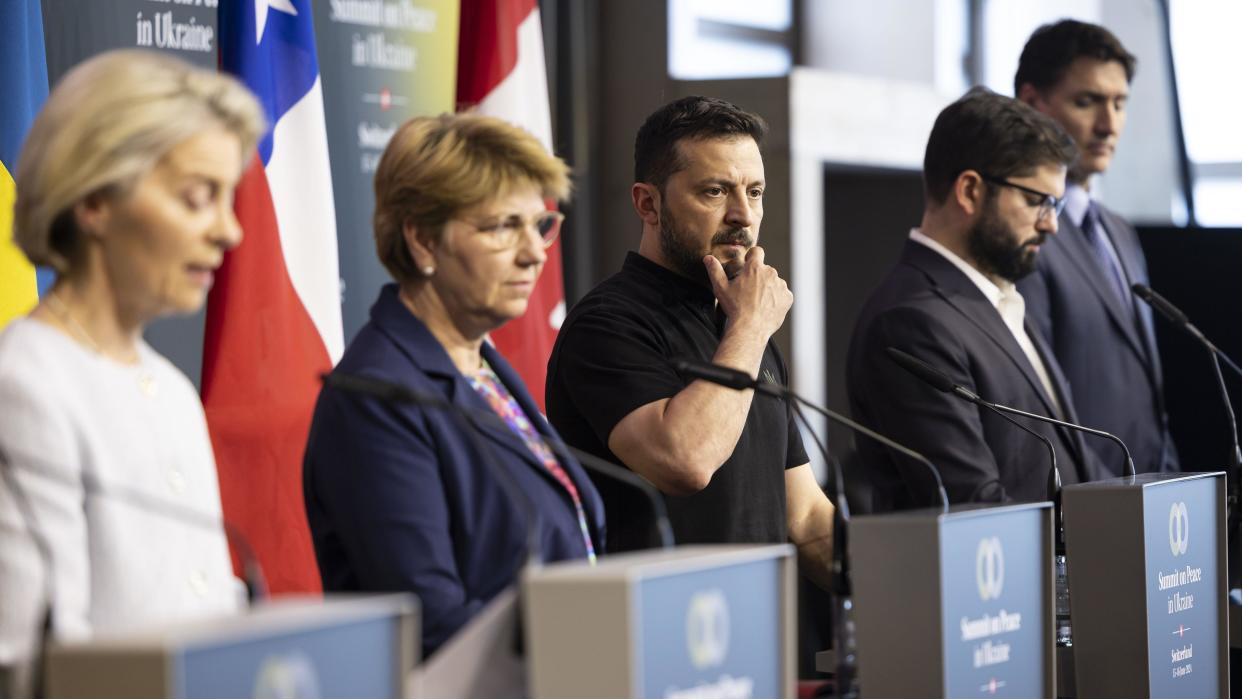Peace talks tomorrow if Russia leaves Ukraine - Zelensky

Kyiv will hold peace talks with Russia tomorrow if Moscow pulls out of all Ukrainian territory, President Volodymyr Zelensky has said.
But speaking at the close of a summit for peace in Switzerland, he said Russian President Vladimir Putin would not end the war and had to be stopped "in any way we can", whether by military or diplomatic means.
Western aid was not enough to win the war, he added, but the summit had shown that international support for Ukraine was not weakening.
The meeting concluded with dozens of countries committing to Ukraine's territorial integrity.
A final document was adopted which blamed the war's widespread suffering and destruction firmly on Russia.
However, several countries attending including India, South Africa and Saudi Arabia did not sign it.
The summit was aimed at creating the broadest possible backing for a process that could help end the war in Ukraine.
More than 90 countries and international organisations attended the summit.
Russia was not invited, and its biggest backer China was not present, leading some to cast doubt on the summit's effectiveness.
Some of those gathered in the Swiss resort of Bürgenstock were not Ukraine's closest supporters, including Saudi Arabia, whose foreign minister has warned that Ukraine will have to make difficult compromises, and Kenya, which spoke out against recent sanctions on Russia.
The final document calls for Ukrainian control to be restored over the Zaporizhzhia nuclear power plant, which is currently occupied by Russia.
It also refers to Russia's invasion as a "war", a label which Moscow has rejected.
It called for the exchange of all prisoners and the return of children abducted by Russia.
The most contentious topics, like the status of land under Russian occupation, will be left for later.
Speaking to journalists after the summit, Mr Zelensky thanked world leaders who attended, saying he was grateful that they had shown independence in coming despite pressure from Russia for them to stay away.
"This summit says that international support [for Ukraine] is not weakening," he said, noting that states not previously involved in diplomatic efforts had joined the process.
And asked by the BBC if Ukraine's weaker position on the battlefield had forced him to consider diplomatic moves, he replied that this was not the case and Ukraine had always talked about peace.
He said Moscow's presence at negotiations would demonstrate its willingness for peace.
"Russia can start negotiations tomorrow if they pull out of our territories," he said.
Mr Zelensky also said that China was not Ukraine's enemy.
"We respect China and its territorial integrity, we want China to do the same for us," he said, while calling on Beijing to seriously engage with developing peace proposals.
Earlier Dutch Prime Minister Mark Rutte said that attendees were united in their quest for peace in Ukraine.
"We all know we're only at the beginning, the beginning of a path to peace," he said.
"And despite some of us around this table having different opinions on how to exactly get to peace for Ukraine, let there be no mistake... we are totally united at a shared vision on principles, on values, on decency.
"You do not invade another country. You do not abduct children. You do not play politics with the world's food supply. And you do not endanger nuclear safety."
It had been expected that all the delegations would endorse a final statement condemning Russia's invasion, but Austrian Chancellor Karl Nehammer told journalists on Sunday that the declaration would not be supported unanimously.
Mr Zelensky said on Saturday that the results of the Swiss summit would be communicated to Moscow "so that at the second peace summit we can fix the real end of the war".
Russia has described the Swiss event as a waste of time, and on Friday President Vladimir Putin said he would agree to a ceasefire if Ukraine withdrew troops from four regions which Russia partially occupies and claims to have annexed.
But a day later Western leaders attending the summit strongly rejected Mr Putin's proposal.
Italian Prime Minister Giorgia Meloni described it as "propaganda" and UK Prime Minister Rishi Sunak accused Mr Putin of "spinning a phoney narrative about his willingness to negotiate".
Then on Sunday Kremlin spokesman Dmitry Peskov said the Russian leader did not rule out talks with Ukraine, but added that guarantees would be needed to ensure their credibility and Mr Zelensky could not be a participant.


